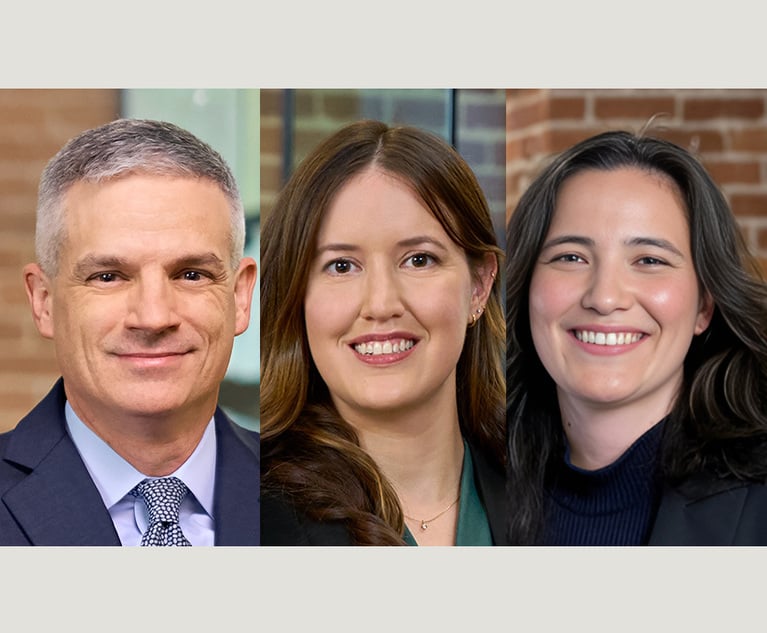Law Firm Marketing Communications in the Age of Coronavirus
In this age of COVID-19 where uncertainly abounds, the role of marketing communications (or marcom) messaging for lawyers and law firms is changing rapidly. This time is an opportunity to take stock internally and tackle some projects that have been gathering dust, while also being an essential resource for clients.
March 26, 2020 at 03:35 PM
5 minute read
 Michael Bond of Blattel Communications.
Michael Bond of Blattel Communications.
In this age of COVID-19 where uncertainly abounds, the role of marketing communications (or marcom) messaging for lawyers and law firms is changing rapidly. Before this crisis materialized, the trend was to position practitioners and firms to client audiences as: problem solvers, and business growers—helping their clients grow their own operations. Attorneys are still problem solvers, but we all now have a universal problem, and one that demands empathy.
Many law firms have created virtual rapid-response teams, swooping in to answer questions (as best as one can) regarding force majeure clauses in contracts and how layoffs can unfold legally while aligning emerging state and federal resources for displaced workers. It does not feel like a time when a lot of new business can be developed (although it is) and certainly isn't one where the public appetite for nonvirus-related news is very high. We're collectively somewhat immobilized, both physically and mentally.
The first way that communications need to adapt is to show genuine concern. It's increasingly common to hope recipients and their families are well. This is a tough time for everyone, and small, meaningful gestures can be helpful. It's believable to say, "I just called to check and see how you are doing." The automatic assumption, for the time being, is that there isn't a sales pitch coming.
Firms and attorneys, next, need to stress that they are available to clients and aligning resources to help them best weather these turbulent times. This takes two forms: the now-ubiquitous messaging about work environment adaptations to ensure safety and business continuity, and keeping up-to-date, on-demand resources visible for concerned clients' review. Projecting calm and preparedness helps diffuse pressure.
While in this environment, it's important that communications and marketing activities continue on dual tracks: rapid-responses to daily challenges, and continued long-term planning and execution of goals, with modifications when needed.
It is a perfectly logical question to ask, "Where do we go from here?" The reality is that no one knows what the market will look like when we emerge from our homes and daily life begins to restart. However, there will still be a need for legal services, a desire to do deals and a wealth of businesses in search of legal guidance. While smart to begin anticipating the path forward, it is also wise to consider, "What can we do in the present?"
With no intention of downplaying the seriousness of the times, firms still have remote workforces deployed who may have extra hours to fill (provided the new co-workers—the kids and pets—allow it). Some marketing initiatives that were on the back-burner can now be given new attention.
Web bios and website language broadly are nonvirus-related and critically important for marketing. The attorneys who have super-skinny bios or are missing representative client engagements from the last 10 years should be dialed-up and plumbed for updated information. The practice or industry group that de facto launched to fill a client need, but is invisible on the website, can be detailed and added to RFP language.
Awards and nominations still exist and will be there when this is over. Pursuing open opportunities; developing a system to prune out marginal, nonimpactful annual "time sucks;" and planning for the remainder of the year are all the equivalent of sowing seeds for a future harvest. This is also a time to identify candidates for promotion and coach them into winning nominations.
It's Chambers time, too. Chambers has announced that they will delay the deadline for nominations, so for firms that scramble every year to get the matters and the materials in place to submit, this lull provides an ideal time to develop processes and get a head start on this involved and often cumbersome activity.
And, if you have ever considered an internal newsletter to champion results and foster camaraderie, this is a great moment to make it happen. We're all simultaneously feeling farther apart and closer together, and these sorts of channels build team spirit.
For firms pursuing specific industries, the current situation has amplified the need to get relevant, customized and actionable content in front of company executives who may be facing difficult choices. For every legal development that occurs, there is value in asking how different industry teams can synthesize the news for their client base. One legal alert may become five targeted articles, each showcasing the firm's depth of understanding as it applies to the various clients' industries.
With screen time rocketing up and social media becoming an increasingly important way for local companies to reach now locked-out customers (think local restaurants offering takeout), this is an opportunity to build out your social media channels. Create an Instagram story breaking down a key development or showcase how attorneys and staff are making work-from-home work. Use services like Zoom and GoToMeeting to educate clients. These "virtual" connections today can become in-person clients with time and care.
Most importantly, take a deep breath. This situation will not last forever. By making plans and being thoughtful with communications and marketing initiatives, firms and attorneys can best position themselves—for both today and tomorrow. When companies choose not to invest in brand promotion their market relevance and visibility tend to rapidly wane. While there are many, many more important things to consider, this time is an opportunity to take stock internally and tackle some marcom projects that have been gathering dust, while also being an essential resource for clients.
Michael Bond is senior media director for Blattel Communications in San Francisco. He can be reached at [email protected], or via the agency's website: http://www.blattel.com.
This content has been archived. It is available through our partners, LexisNexis® and Bloomberg Law.
To view this content, please continue to their sites.
Not a Lexis Subscriber?
Subscribe Now
Not a Bloomberg Law Subscriber?
Subscribe Now
NOT FOR REPRINT
© 2025 ALM Global, LLC, All Rights Reserved. Request academic re-use from www.copyright.com. All other uses, submit a request to [email protected]. For more information visit Asset & Logo Licensing.
You Might Like
View All

California’s Workplace Violence Laws: Protecting Victims’ Rights in the Workplace
6 minute read

'Nothing Is Good for the Consumer Right Now': Experts Weigh Benefits, Drawbacks of Updated Real Estate Commission Policies
Trending Stories
- 1Deadline Extended for Southeastern Legal Awards
- 2Church of Scientology Set to Depose Phila. Attorney in Sexual Abuse Case
- 3An AG Just Specified How AI Could Get You in Hot Water
- 4Supreme Court Appears to Lean Toward Letting TikTok Ban Take Effect
- 5Standing Spat: Split 2nd Circuit Lets Challenge to Pfizer Diversity Program Proceed
Who Got The Work
Michael G. Bongiorno, Andrew Scott Dulberg and Elizabeth E. Driscoll from Wilmer Cutler Pickering Hale and Dorr have stepped in to represent Symbotic Inc., an A.I.-enabled technology platform that focuses on increasing supply chain efficiency, and other defendants in a pending shareholder derivative lawsuit. The case, filed Oct. 2 in Massachusetts District Court by the Brown Law Firm on behalf of Stephen Austen, accuses certain officers and directors of misleading investors in regard to Symbotic's potential for margin growth by failing to disclose that the company was not equipped to timely deploy its systems or manage expenses through project delays. The case, assigned to U.S. District Judge Nathaniel M. Gorton, is 1:24-cv-12522, Austen v. Cohen et al.
Who Got The Work
Edmund Polubinski and Marie Killmond of Davis Polk & Wardwell have entered appearances for data platform software development company MongoDB and other defendants in a pending shareholder derivative lawsuit. The action, filed Oct. 7 in New York Southern District Court by the Brown Law Firm, accuses the company's directors and/or officers of falsely expressing confidence in the company’s restructuring of its sales incentive plan and downplaying the severity of decreases in its upfront commitments. The case is 1:24-cv-07594, Roy v. Ittycheria et al.
Who Got The Work
Amy O. Bruchs and Kurt F. Ellison of Michael Best & Friedrich have entered appearances for Epic Systems Corp. in a pending employment discrimination lawsuit. The suit was filed Sept. 7 in Wisconsin Western District Court by Levine Eisberner LLC and Siri & Glimstad on behalf of a project manager who claims that he was wrongfully terminated after applying for a religious exemption to the defendant's COVID-19 vaccine mandate. The case, assigned to U.S. Magistrate Judge Anita Marie Boor, is 3:24-cv-00630, Secker, Nathan v. Epic Systems Corporation.
Who Got The Work
David X. Sullivan, Thomas J. Finn and Gregory A. Hall from McCarter & English have entered appearances for Sunrun Installation Services in a pending civil rights lawsuit. The complaint was filed Sept. 4 in Connecticut District Court by attorney Robert M. Berke on behalf of former employee George Edward Steins, who was arrested and charged with employing an unregistered home improvement salesperson. The complaint alleges that had Sunrun informed the Connecticut Department of Consumer Protection that the plaintiff's employment had ended in 2017 and that he no longer held Sunrun's home improvement contractor license, he would not have been hit with charges, which were dismissed in May 2024. The case, assigned to U.S. District Judge Jeffrey A. Meyer, is 3:24-cv-01423, Steins v. Sunrun, Inc. et al.
Who Got The Work
Greenberg Traurig shareholder Joshua L. Raskin has entered an appearance for boohoo.com UK Ltd. in a pending patent infringement lawsuit. The suit, filed Sept. 3 in Texas Eastern District Court by Rozier Hardt McDonough on behalf of Alto Dynamics, asserts five patents related to an online shopping platform. The case, assigned to U.S. District Judge Rodney Gilstrap, is 2:24-cv-00719, Alto Dynamics, LLC v. boohoo.com UK Limited.
Featured Firms
Law Offices of Gary Martin Hays & Associates, P.C.
(470) 294-1674
Law Offices of Mark E. Salomone
(857) 444-6468
Smith & Hassler
(713) 739-1250






